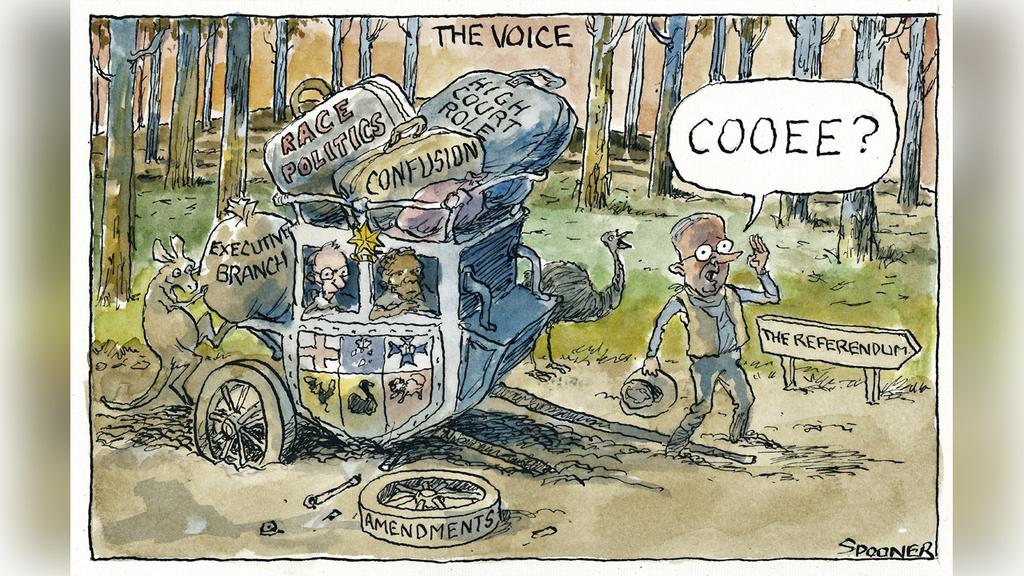With not much happening on the polling front his week, there is the following to relate:
• There is a modest field of five candidates for the April 1 by-election for Aston, which I’ve had less to say about than I would have liked due to the distraction of New South Wales. Following the ballot paper draw last Thursday, they are in order: Owen Miller (Fusion), Roshena Campbell (Liberal), Angelica Di Camillo (Greens), Mary Doyle (Labor) and Maya Tesa (Independent). Pauline Hanson interestingly offered last week that One Nation had decided to stay out of it as a “strategic decision not to take votes away from the Coalition”.
• Paul Sakkal of The Age reports that not only have Monique Ryan’s recent difficulties encouraged Josh Frydenberg in his determination to recontest Kooyong at the election, but that Tim Wilson and Katie Allen have similar ideas about Goldstein and Higgins, which they respectively lost to teal independent Zoe Daniel and Labor’s Michelle Ananda-Rajah.
• A by-election will be held in the Northern Territory on Saturday for the seat of Arafura following the death of Labor member Lawrence Costa. The candidates in ballot paper order are Leslie Tungatalum (Country Liberals), Manuel Brown (Labor) and Alan Middleton (Federation Party).
• The West Australian reports a rare item of state political polling crediting Mark McGowan with an approval rating of 63%, down seven since October, with disapproval up six to 24%. New Liberal leader Libby Mettam debuts with 24% approval and 18% disapproval. The poll was conducted “last week” by Painted Dog Research from a sample of 1052.
Lol. Mark Latham says Matt Kean is a cancer inside the NSW Liberal Party.
Matt Kean is the only thing saving the NSW Liberal Party from the same sort of annihilation at the NSW election next week that the federal Liberals suffered last year.
Vladimir Putin is a horrible individual. Visiting Mariupol after going to Crimea was nasty stuff. I wish President Zelenskyy had known and sent someone to arrest the bastard. Because Mariupol is still Ukrainian territory!
For those who don’t have a subscription to the Fairfax media I reprint this interview in full because it’s the best one yet and should be the final word(s):
https://www.smh.com.au/politics/federal/is-our-368-billion-splash-suboptimal-i-did-a-deep-dive-with-a-navy-commander-20230316-p5cssh.html
Good morning Dawn Patrollers
Ross Gittins rips into the latest Productivity Commission report, saying, “Until the capitalist system goes back to keeping its promise that the workers will get their fair share of the benefits of capitalism – Australia’s households have no rational reason to give a stuff about what’s happening to productivity.” A very good read.
https://www.smh.com.au/business/the-economy/the-productivity-commission-wants-wage-bargaining-shifted-further-in-favour-of-employers-20230319-p5ctcp.html
The illusions of neoliberal capitalism are dismantling, and the true perpetrators of poverty are being unmasked, writes John Falzon. He says trickle-down theory is no mystery. It is an excellent example of the so-called common sense that is designed to throw us off the scent of what is really happening, trying to convince us that the obscene proliferation of mega-profits should not only be allowed but encouraged because it is the only means of salvation for those who are living in poverty.
https://www.canberratimes.com.au/story/8122774/poverty-a-feature-of-profits-not-a-bug/?cs=14258
Sean Kelly’s piece today provides a good insight to the state of political debate and action in Australia now.
https://www.smh.com.au/politics/federal/the-end-of-albanese-s-other-honeymoon-20230319-p5ctbv.html
The energy market operator’s urgent warning of a gas shortage has heated up a political brawl between the Greens and the federal government as time runs down for Energy Minister Chris Bowen to reform the safeguard mechanism to deliver on Australia’s legally binding climate target, reports Mike Foley.
https://www.smh.com.au/politics/federal/gas-shortfall-warning-heats-safeguard-mechanism-debate-as-time-ticks-down-20230319-p5ctdz.html
The AFR says that the national economic policy think tank has come up with a policy that centre-right parties supposedly committed to free market principles should embrace.
https://www.afr.com/policy/energy-and-climate/an-economically-rationalist-climate-transition-policy-20230316-p5csl9
If Minns seizes power, he will be a premier who lumbered over the line, rather than sprinted, says Alexandra Smith who points to the Coalition’s primary vote shooting up six percentage points to 38 per cent since the last Resolve survey in late February, Labor’s remaining exactly where it was – on 38 per cent. The Coalition is making gains; Labor is steady.
https://www.smh.com.au/politics/nsw/if-minns-seizes-power-he-will-be-a-premier-who-lumbered-over-the-line-rather-than-sprinted-20230319-p5cteh.html
https://www.smh.com.au/politics/nsw/perrottet-narrowing-tight-contest-but-labor-tipped-to-sweep-to-power-20230319-p5ctf7.html
The whole commercial banking structure is built on the foundation of “sticky” deposits – but these are now fast-moving and volatile, writes Karen Maley.
https://www.afr.com/companies/financial-services/the-banking-model-is-wobbling-as-deposits-become-flighty-20230319-p5ctb9
Three times the number of high-income earners will be hit by the former Coalition government’s 2017 tax increase on superannuation, compared to Labor’s targeting of savers with retirement income balances above $3 million. John Kehoe reports that Jim Chalmers accused the Liberal Party of “hypocrisy” after releasing the new Treasury figures.
https://www.afr.com/policy/tax-and-super/labor-slams-hypocrisy-over-3m-super-cap-criticism-20230319-p5ctdf
Daniel Hurst looks at the modelling informing the above accusation.
https://www.theguardian.com/australia-news/2023/mar/20/coalitions-super-changes-will-affect-three-times-as-many-people-as-labors-plan-modelling-shows
According to Simon Benson, Treasury is looking to dust off a mothballed proposal to claw back a rise in deductible work-related expenses which are forecast to cost the budget more than $10.4bn in forgone revenue annually by next year.
https://www.theaustralian.com.au/nation/treasury-is-looking-at-a-potential-clampdown-on-workathome-expenses-to-repair-budget/news-story/515cc86aace6152de13295c0cc3d4ad8?amp
The Australian Electoral Commission (AEC) has gone against its own rules to green-light the billionaire Lowy family’s $550,000 in secretive “donations” to the Liberal Party via an obscure subsidiary, reveals Anthony Klan.
https://independentaustralia.net/politics/politics-display/lowy-family-use-loophole-to-donate-550000-to-liberal-party,17340
Victorian opposition leader John Pesutto will move to expel controversial Liberal MP Moira Deeming from the parliamentary party room after she attended a rally that has been associated with neo-Nazis. Sumeyya Ilanbey reports that Deeming attended the Let Women Speak rally organised by British anti-trans rights campaigner Kellie-Jay Keen-Minshull at Parliament House on Saturday.
https://www.theage.com.au/politics/victoria/liberals-move-to-expel-moira-deeming-over-neo-nazi-rally-links-20230319-p5ctgm.html
And Daniel Andrews has said the human rights of trans people are “not negotiable” and that “Nazis aren’t welcome” after a group performed the Nazi salute on the steps of the state’s parliament on Saturday.
https://www.theguardian.com/australia-news/2023/mar/19/daniel-andrews-says-nazis-arent-welcome-as-victorian-government-considers-further-action-following-salutes
The cost of living crisis is driving rising levels of reported distress in NSW, as the nation’s peak suicide prevention group says an increase in deaths among middle-aged men should be a wake-up call for the next parliament. Mary Ward tells us that Suicide Prevention Australia is calling for NSW to follow South Australia’s lead and implement dedicated suicide prevention legislation, which would require lawmakers to consider the mental health impacts of housing and welfare policies.
https://www.smh.com.au/politics/nsw/cost-of-living-crisis-drives-surge-in-middle-aged-male-suicides-20230316-p5csti.html
These educational academics tell us how school principals are reaching crisis point, pushed to the edge by mounting workloads, teacher shortages and abuse.
https://theconversation.com/school-principals-are-reaching-crisis-point-pushed-to-the-edge-by-mounting-workloads-teacher-shortages-and-abuse-201777
Alan Kohler writes that thanks to AUKUS, Australia’s manufacturing will be built on a foundation of defence, specifically buying and making nuclear submarines. But, he says, there is likely to be an opportunity cost in that. Given the amount of money involved there won’t be much, if any, left for anything else, such as the global energy transition, health care and agriculture.
https://thenewdaily.com.au/finance/the-innovators/2023/03/20/alan-kohler-innovators-20-march/
The former head of the royal commission into the Lawyer X scandal has raised concerns with the government about its proposed informant laws ahead of the draft legislation being debated in parliament this week.
https://www.theage.com.au/politics/victoria/lawyer-x-royal-commissioner-concerned-about-new-informant-bill-20230317-p5cszm.html
Binoy Kampmark examines Australia’s nuclear waste problem.
https://theaimn.com/spent-matters-the-aukus-nuclear-waste-problem/
Uber has launched a months-long advertising campaign over the Albanese government’s proposed gig economy reforms in a push to get a seat at the table over changes that will affect its 150,000 workers. The ride share and on-demand delivery giant will target politicians in Canberra and other capital cities from Monday and over the next few months with billboards, posters and digital and print ads in an effort to push the argument its riders and drivers want flexibility.
https://www.afr.com/work-and-careers/workplace/uber-launches-ad-blitz-over-labor-s-gig-economy-reforms-20230319-p5ctal
Fathers who share childcare face the same sexist assumptions about how good a worker you can be as women stared down for decades. For the health of men, women, kids and the economy, ideas of Australian workplace masculinity must at least try to keep up, writes Wendy Touhy.
https://www.theage.com.au/national/now-fathers-are-copping-the-motherhood-penalty-i-for-one-am-not-gloating-20230319-p5ctcg.html
Donna Mulhearn, who was a human shield during the Iraq war and later returned as an aid worker and researcher, argues why we need to change the practice where one person can decide if Australia goes to war..
https://www.smh.com.au/politics/federal/one-person-can-decide-if-australia-goes-to-war-here-s-why-that-needs-to-change-20230315-p5csb6.html
Prime CBD office towers could potentially drop in value by between 10 per cent to 20 per cent as commercial property assets are eventually marked down to a market drastically reconfigured by higher interest rates, explains Nick Leneghan who says that thos could affect superannuation fund valuations and banking covenants.
https://www.afr.com/property/commercial/cbd-office-towers-face-price-falls-of-up-to-20pc-20230317-p5ct5t
The Consumer Action Law Centre has warned that Australia is a soft target for scammers who are now using artificial intelligence to impersonate the voices of family members.
https://www.smh.com.au/business/consumer-affairs/hey-mum-there-s-an-ai-scam-that-can-impersonate-my-voice-20230307-p5cq63.html
Reuters reports that if UBS acquires Credit Suisse 10,000 jobs may go and just as I type this I see a live press conference from the Swiss government announcing that the takeover will indeed happen.
https://www.smh.com.au/business/banking-and-finance/if-ubs-acquires-credit-suisse-10-000-jobs-may-go-20230319-p5ctco.html
It’s a three billion dollars deal.
https://www.smh.com.au/business/banking-and-finance/ubs-to-buy-credit-suisse-in-historic-3b-deal-to-end-crisis-20230320-p5ctgw.html
Rob Harris writes that Emmanuel Macron is so convinced that France cannot afford to continue losing its workforce to retirement at the age of 62 that he’s prepared to risk his authority to play a high-stakes game of political chicken. Since Macron’s government introduced plans to push the retirement age back from 62 to 64 – France has been convulsed by regular strikes and protests that have drawn millions into the streets, not only in the capital, but in towns and villages across the country.
https://www.smh.com.au/world/europe/macron-plays-high-stakes-game-of-political-chicken-over-pension-20230319-p5ctbu.html
Geoffrey Robertson thinks that the arrest warrant may signal the beginning of the end for Putin. He says that although he will not stand in the dock at The Hague any time soon, he is now confirmed as an international pariah, with predecessors like Pinochet, Milosevic, Gaddafi and Al Bashir – all of whose indictments were a prelude to their fall from power.
https://www.smh.com.au/world/europe/arrest-warrant-may-signal-the-beginning-of-the-end-for-putin-20230319-p5ctbw.html
While Narendra Modi polls extremely well, many worldly Indians are aghast that he has made India less secular and tolerant, creating a Hindu nationalism that marginalises religious minorities.
https://www.smh.com.au/world/asia/narendra-modi-is-the-world-s-most-popular-leader-beware-20230319-p5ctgp.html
Donald Trump could be charged in New York as soon as this week for allegedly covering up hush money payments to a porn star during his 2016 presidential campaign, nearly seven years after the money changed hands. But any trial of the former US president would still be more than a year away, legal experts said, and could coincide with the final months of the 2024 presidential campaign as Trump seeks a return to the White House.
https://www.theage.com.au/world/north-america/donald-trump-could-be-charged-any-day-what-happens-next-20230319-p5ctgs.html
The Manhattan district attorney widely expected to bring an indictment against Donald Trump this week has vowed that his staff will not be intimidated after the former US president called for his supporters to protest any action against him.
https://www.theguardian.com/us-news/2023/mar/19/trump-calls-for-protest-manhattan-da-warns-of-intimidation
Cartoon Corner
David Rowe







Peter Broelman
Joe Benke
Megan Herbert
Mark David
Mark Knight
Spooner
From the US